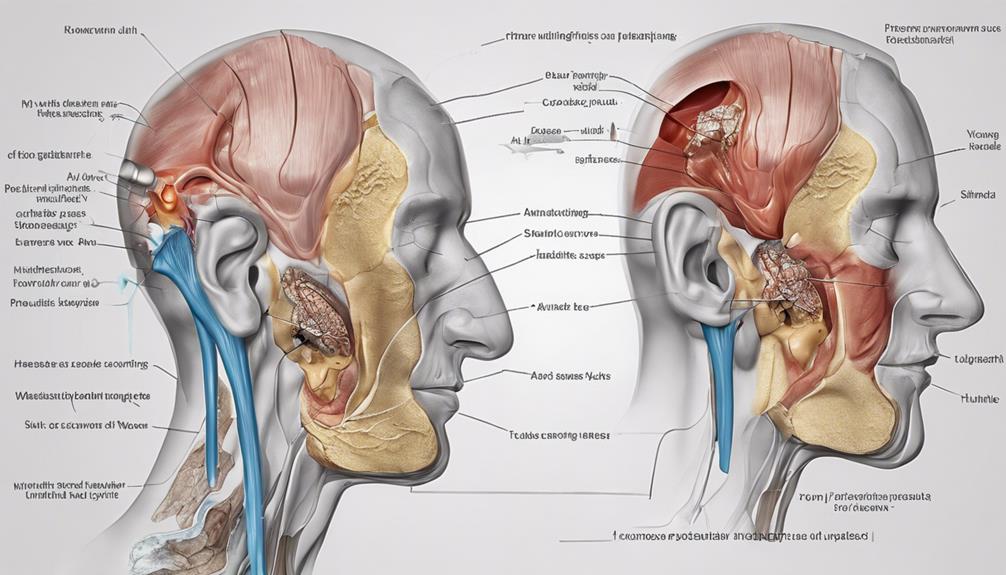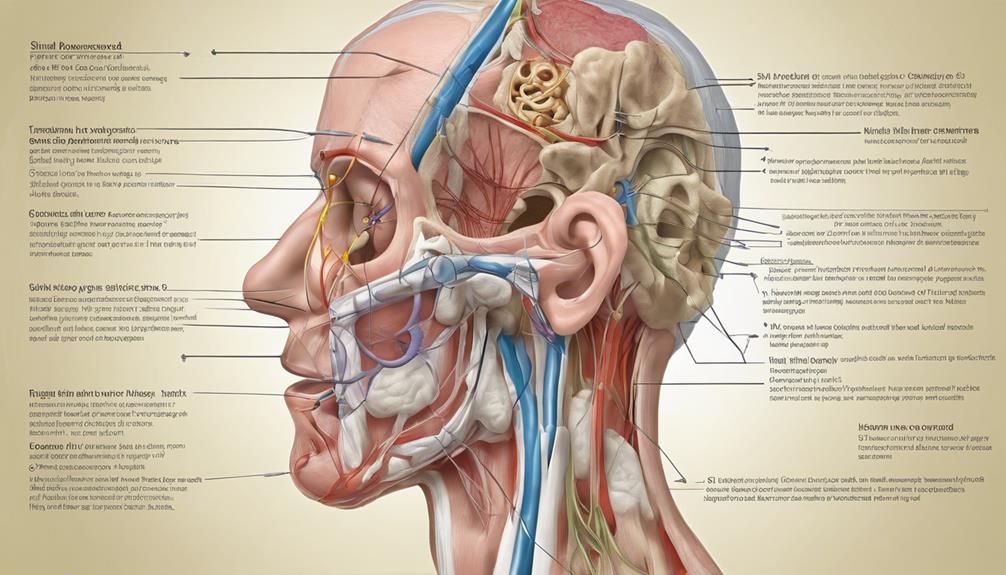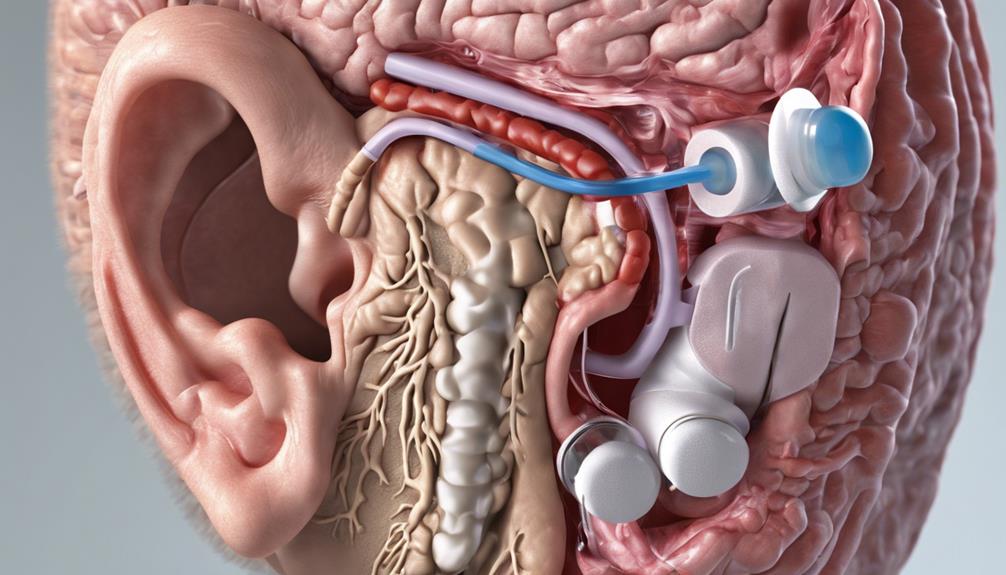In the world of health, it is commonly believed that ‘prevention is better than cure.’ The link between sinus problems and hearing loss goes beyond what one may anticipate.
The intricate relationship between sinus congestion and hearing impairment can have significant repercussions on our auditory abilities. Understanding how sinus problems can impact hearing is not only informative but also essential for maintaining overall well-being.
Let's explore the complexities of this relationship and uncover strategies to preserve our hearing health effectively.
Key Takeaways
- Sinus problems impact Eustachian tubes, leading to hearing issues.
- Eustachian tube dysfunction causes ear fullness and muffled hearing.
- Prompt treatment of sinus congestion is vital to prevent hearing loss.
- Seeking professional help for sinus-related hearing problems is crucial.
The Sinus-Ear Connection
When sinus issues arise, they can intricately impact the ears through the interconnected network of the Eustachian tubes. The Eustachian tubes play a crucial role in maintaining proper ear function, particularly in terms of conductive hearing. These tubes are responsible for equalizing pressure between the middle ear and the environment outside the body. However, when inflamed due to sinus problems, these tubes struggle to perform this function effectively. This inflammation can lead to symptoms such as ear fullness and muffled hearing, affecting one's overall auditory experience.
Moreover, the Eustachian tubes aren't the only part of the ear susceptible to sinus-related issues. Severe sinus congestion can extend its impact to the inner ear, potentially causing sensorineural hearing loss. This type of hearing loss originates in the inner ear or the auditory nerve and can result in difficulties processing sound properly. Understanding the intricate connection between the sinuses and the ears is essential in comprehending how sinus issues can disrupt the delicate mechanisms responsible for our hearing abilities.
Impact of Sinus Issues on Hearing

Exploring the repercussions of sinus issues on hearing reveals an intricate interplay between sinus congestion and auditory function. Sinus congestion can significantly impact hearing by affecting the Eustachian tubes, which are responsible for regulating pressure in the middle ear. When nasal passages are congested due to sinus problems, proper pressure equalization becomes challenging, leading to symptoms like ear fullness and muffled hearing. This congestion can also result in fluid buildup in the middle ear, causing conductive hearing loss.
The Eustachian tubes play a crucial role in maintaining ear health, and any disruption caused by sinus congestion can have a direct impact on hearing. Allergies further exacerbate these issues by increasing sinus congestion, which, in turn, affects the Eustachian tubes' ability to function correctly. Over time, persistent sinus problems can also affect the inner ear, potentially leading to sensorineural hearing loss. Understanding the relationship between sinus issues, Eustachian tube function, and hearing loss is essential for managing and addressing these interconnected issues effectively.
Understanding Eustachian Tube Dysfunction
Understanding Eustachian tube dysfunction is crucial for grasping the intricate relationship between sinus issues and potential hearing complications. The Eustachian tubes play a vital role in connecting the middle ear to the throat, facilitating pressure equalization. When these tubes malfunction, symptoms such as ear fullness, muffled hearing, and pain can manifest.
Proper Eustachian tube function is essential for optimal ear performance and hearing ability. Sinus congestion is a common culprit behind Eustachian tube dysfunction, as it disrupts the pressure regulation in the ears. Managing sinus congestion effectively is key to preventing Eustachian tube dysfunction and the subsequent hearing issues that may arise.
Preventing Hearing Loss From Sinus Problems

To safeguard against potential hearing loss stemming from sinus problems, proactive management of sinus issues is paramount in addressing blockages that can impact the ear canal and Eustachian tubes.
Here are three key strategies to prevent hearing loss related to sinus problems:
- Consultation with Specialists: Regular visits to ear, nose, and throat (ENT) specialists can help monitor sinus health and address any issues promptly. Specialists can provide tailored treatment plans to alleviate sinus blockages that may affect hearing.
- Home Remedies: Utilizing home remedies like humidifiers and nasal sprays can help maintain sinus health. Keeping the sinuses moist and clear can reduce the risk of blockages that could lead to hearing problems.
- Prompt Action: Addressing any sinus issues promptly is crucial in preventing complications that may impact hearing. Early intervention can help preserve optimal hearing function and minimize the risk of long-term hearing loss associated with sinus problems.
Seeking Professional Help for Sinus-Related Hearing Issues
Seeking assistance from an ENT specialist is essential for accurate diagnosis and tailored treatment of sinus-related hearing issues. When experiencing hearing problems due to sinus and nasal issues, consulting an ENT specialist is crucial.
These doctors specialize in conditions affecting the ears, nose, and throat, allowing them to perform thorough evaluations to determine the extent of sinus impact on hearing function. Through their expertise, ENT specialists can create personalized treatment plans that may involve medications, sinus therapies, or surgical interventions as necessary.
By seeking professional help, individuals can ensure proper management of sinus congestion, preventing potential complications like hearing loss. Expert guidance from ENT specialists not only helps alleviate symptoms but also aims to restore hearing function, ultimately improving the overall quality of life for those affected by sinus-related hearing issues.
Therefore, if you're experiencing hearing difficulties related to sinus problems, scheduling an appointment with an ENT specialist is the first step towards finding relief and improving your auditory health.
Frequently Asked Questions
Can Sinus Problems Cause Loss of Hearing?
Yes, sinus problems can indeed cause loss of hearing. Eustachian tube dysfunction due to sinus issues can lead to ear fullness, muffled hearing, and potential hearing loss.
Sinus congestion can disrupt pressure regulation in the ears, affecting middle ear function and potentially causing conductive hearing loss. Allergies and inflammation from sinus problems can worsen ear-related symptoms, contributing to persistent hearing issues.
Effective management of sinus problems is crucial to prevent complications that can result in temporary or permanent hearing loss.
How Long Does It Take to Fully Recover From Sinusitis?
Ironically, recovery from sinusitis can feel like a never-ending saga. The duration varies depending on the infection type; acute sinusitis typically lasts 1-2 weeks, while chronic cases can drag on for weeks to months.
Factors like treatment adherence, overall health, and immune responses influence the recovery timeline. For a precise estimate, consulting a healthcare professional is vital to navigate the sinusitis recovery labyrinth.
How Can I Get My Hearing Back From Sinuses?
We can regain hearing affected by sinus issues through prompt sinus congestion management. Seeking evaluation and treatment from an ENT specialist is crucial. Proper diagnosis and treatment of sinus infections can reverse temporary hearing loss.
Utilizing nasal sprays and humidifiers as home remedies supports hearing recovery. Effective sinusitis management prevents further ear damage and facilitates hearing restoration. It's essential to address sinus problems promptly to aid in regaining lost hearing.
How Do You Relieve Sinus Pressure in Your Ears?
We relieve sinus pressure in our ears by using warm compresses, nasal decongestants, saline sprays, and the Valsalva maneuver.
Staying hydrated and taking over-the-counter pain relievers like ibuprofen can also help.
These methods can reduce congestion, equalize ear pressure, and alleviate discomfort associated with sinus issues.
It's important to address sinus pressure promptly to prevent further complications.
Are Sinus Issues a Common Cause of Hearing Loss?
Yes, there is a proven sinus infection hearing loss connection. Sinus issues can lead to blockages in the Eustachian tube, affecting the middle ear and causing temporary hearing loss. This can be resolved once the sinus infection is treated. If you experience hearing loss, consult a doctor to rule out any sinus-related causes.
Conclusion
In conclusion, sinus issues can have a significant impact on our hearing, causing discomfort and potential long-term damage. By addressing sinus problems promptly and seeking professional help when needed, we can protect our hearing health and prevent further complications.
Imagine a world where clear sinuses lead to clear hearing, allowing us to fully experience the richness of sound around us. Let's take proactive steps to ensure our ears and sinuses are in harmony for a vibrant and healthy life.











